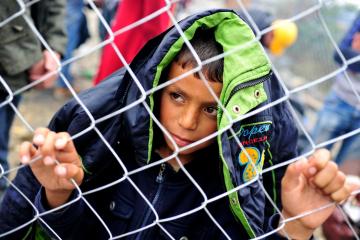Better guardianship key to better protection for child victims of trafficking

“Children deprived of parental care are at heightened risk of trafficking. Guardianship can help to prevent trafficking, protect children and enable them to exercise their rights,” says EU Anti-Trafficking Coordinator, Dr Myria Vassiliadou, ahead of the events marking EU Anti-Trafficking Day on 18 October. “The European Commission is committed to ensuring all children are safe from trafficking.”
“Thousands of unaccompanied children are trafficked into and throughout the EU. Many are being let down by the systems that should protect them,” says FRA Director a.i. Constantinos Manolopoulos. “Qualified guardians can, and should, be vital to the wellbeing of such vulnerable children. To better protect children from harm, Member States should urgently develop and implement quality standards that will strengthen guardianship across the EU.”
Guardians are a key element of protection systems for children who cannot have their interests represented by their parents. This report, Guardianship systems for children deprived of parental care in the European Union, explores the key features of guardianship systems across all EU Member States that have been established to meet the needs of children without parental care. It includes those at risk of becoming victims of human trafficking or other forms of violence and exploitation.
This comparative report complements the handbook on guardianship for children deprived of parental care that should soon be available in all official EU languages. It will help decision makers take measures to promote the effective protection of all children, in line with the EU’s anti-trafficking Directive and Strategy. It does this by explaining the strengths and weaknesses of national guardianship systems which vary greatly from country to country, even within countries. For example:
- Appointment procedures: The time taken to appoint guardians and the process itself vary considerably, lasting up to one year. This is despite laws that state that the process should be quick. Such variations can be even more pronounced when guardianship is managed regionally or locally. This is not in the best interests of the child as it leaves children uncared for and uncertain until arrangements are in place.
- Qualifications and skills: In most Member States guardians should be competent and qualified by law. However, requirements tend to be very general, and systematic training is lacking, particularly with respect to the needs of trafficked children.
- Duties and tasks: Laws tend to only define the duties and tasks of guardians in general terms, except for the duty to legally represent children. As a result how common tasks are performed, such as taking care of the child’s education and healthcare, varies. Some accompany children to doctors’ meetings, others do not; some never even meet the child.
- Systems for foreign or trafficked children: No Member State has a separate system for trafficked children. Generally children are legally protected no matter what their nationality or status is. However, in practice their migration and residence status often determines guardianship and representation arrangements.
- Legal representation and legal aid: Despite the importance of having specialised legal aid for child victims of trafficking, specialist lawyers are rare and are often unavailable.
- Accountability and monitoring: Although all Member States have systems for monitoring and supervising guardians, they are often poorly structured and inefficient. In addition, complaint mechanisms are missing.
Overall, the lack of a uniform approach to guardianship, despite provisions in national and international law, often results in less than adequate support and protection for the children the systems were set up to protect. Migration and asylum law also often overrides child protection law.
An integrated approach to child protection that looks to the best interests of the child is therefore clearly needed. Harmonising and strengthening guardianship systems is a vital component of protecting children from all forms of violence and exploitation.
This report underlines the wide variation that currently exists across all Member States. To read the report, see: Guardianship systems for children deprived of parental care in the European Union.
For further information please contact: media@fra.europa.eu / Tel.: +43 1 580 30 642
Notes to editors:
- The data presented in the report were used to shape the handbook on Guardianship for children deprived of parental care, published in June 2014 in cooperation with the European Commision, as part of the EU’s anti-trafficking Strategy.
- Comparative data and key findings on national child protetcion systems are avaible online.
- Other FRA work on child rights and asylum, migration and borders can be found on FRA’s website.
- The EU’s response to trafficking and related statistics can be found on the Commission’s anti-trafficking website. This includes the EU’s anti-trafficking Directive and Strategy towards the eradication of trafficking in human beings 2012-2016.
- The EU Agency for Fundamental Rights (FRA) provides evidence-based advice to EU and national decision makers, thereby contributing to more informed and better targeted debates and policies on fundamental rights.